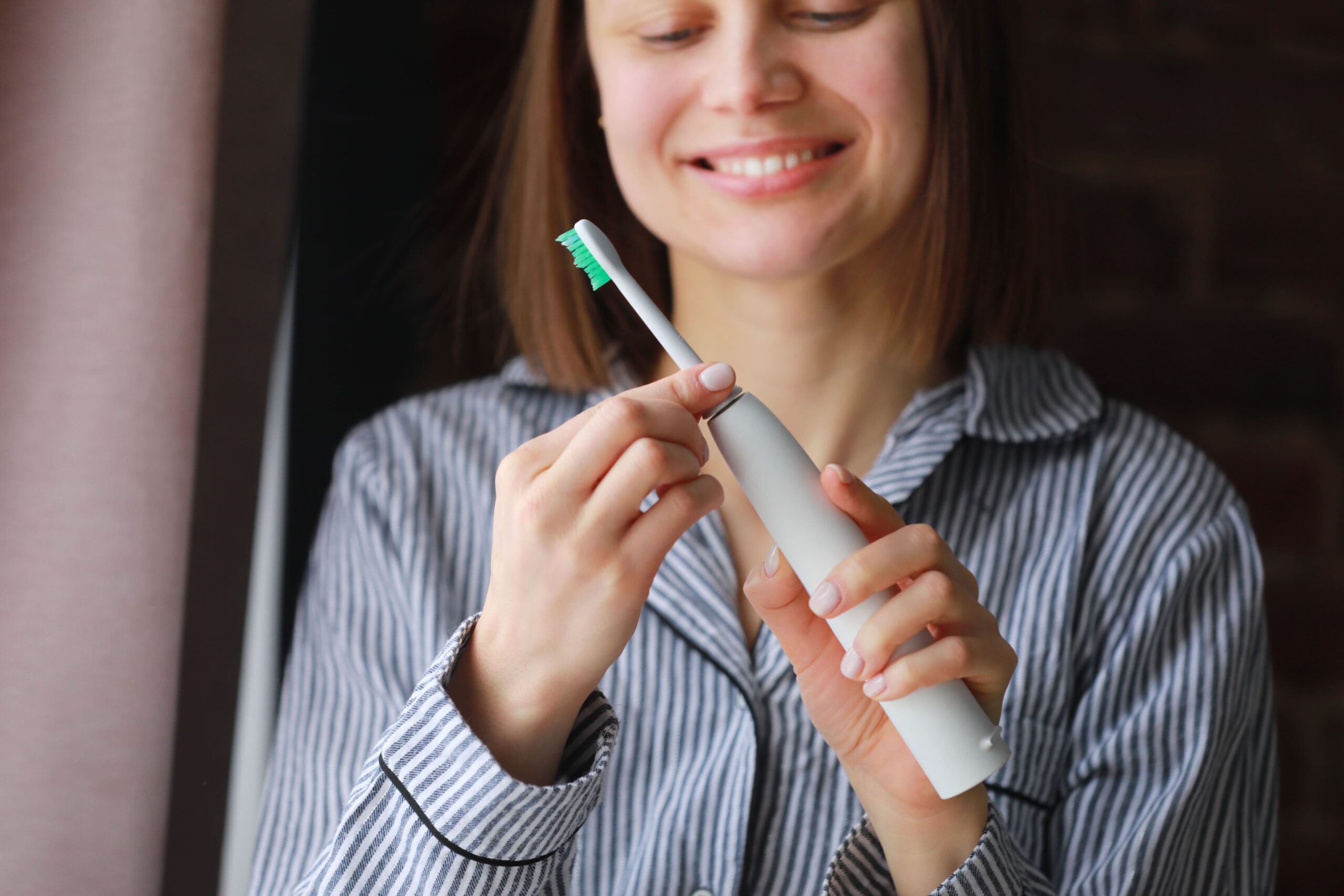In the world of dental care, myths and misunderstandings can often cloud our judgment and…

The Top Reasons To Take a Look at Electric Toothbrushes and Water Flossers
Electric toothbrushes have been taking the dental hygiene world by storm over the last few decades, and for good reason. These innovative devices and their water flossing counterparts offer a range of benefits that make them stand out from traditional toothbrushes. From improved plaque removal to easier use for those with physical limitations, electric toothbrushes reign supreme in the world of oral care. In this blog, we’ll explore the benefits of electric toothbrushes and water flossers and why they are worth considering for your daily dental routine.
All The Buzz About Electric Toothbrushes
When it comes to dental hygiene, electric toothbrushes are like the superheroes of the oral care world. These amazing devices are equipped with advanced technology that can work wonders for your dental health. The power of electric toothbrushes lies in their ability to provide a more efficient and effective cleaning experience compared to traditional toothbrushes. With their high-speed bristle movements, electric toothbrushes can reach deep into those hard-to-reach places, removing plaque and bacteria with ease.
In addition, many electric toothbrushes also come with built-in timers to ensure you brush for the recommended two minutes. This helps to eliminate any guesswork and ensures that each tooth gets the attention it deserves. And for those with physical limitations, such as arthritis or mobility issues, electric toothbrushes are a game-changer. The powered bristles do most of the work for you, making brushing easier and more effective.
What To Know About Water Flossing Devices
Water flossing devices, or oral irrigators, are incredibly effective when it comes to maintaining optimal oral hygiene. Unlike traditional flossing methods, water flossers use a powerful stream of water to effectively remove plaque, food particles, and debris from between the teeth and along the gum line. This thorough and deep clean can help prevent cavities, gum disease, and bad breath.
One of the major advantages of water flossing devices is their convenience. Traditional flossing can be time-consuming and often uncomfortable, especially for those with sensitive gums. With water flossers, you simply aim the nozzle at the spaces between your teeth and let the water do the work. It’s quick, easy, and doesn’t require the same level of dexterity as traditional flossing.
Water flossers are also great for those with braces, implants, or other dental appliances. The powerful stream of water can effectively clean around brackets and wires, removing any trapped food particles and bacteria. This helps to keep your teeth and gums healthy during orthodontic treatment or with dental restorations.
Additionally, water flossers are gentle on your gums, reducing the risk of irritation or bleeding. This makes them an ideal option for individuals with sensitive gums or gum disease.
Traditional and Modern Oral Hygiene Tools—A Comparison
When it comes to oral hygiene, there is a battle between traditional and modern tools. Traditional toothbrushes and floss have been around for centuries, while electric toothbrushes and water flossing devices are the new kids on the block. So, how do they stack up against each other?
Let’s start with traditional toothbrushes. They are simple, inexpensive, and widely available. You have control over the pressure and technique you use, and they are portable and easy to use. However, traditional toothbrushes rely solely on your manual brushing technique, which can be less effective in removing plaque and reaching hard-to-reach areas.
On the other hand, electric toothbrushes take dental hygiene to the next level. With their high-speed bristle movements, they provide a more efficient and effective clean compared to traditional toothbrushes. The powered bristles do most of the work for you, reaching deep into those nooks and crannies to remove plaque and bacteria with ease. Additionally, many electric toothbrushes come with built-in timers to ensure you brush for the recommended two minutes, eliminating any guesswork.
When it comes to flossing, traditional floss can be time-consuming and uncomfortable, especially for those with sensitive gums. Water flossing devices, on the other hand, use a powerful stream of water to effectively remove plaque, food particles, and debris from between the teeth and along the gum line. They are quick, easy, and don’t require the same level of dexterity as traditional flossing.
In comparing traditional and modern oral hygiene tools, it’s clear that electric toothbrushes and water flossing devices have the upper hand. They’re more efficient and effective, making it easier than ever to maintain optimal oral hygiene. The team at Apple Valley Dental can offer professional guidance as to which option is right for your family.
When to Start Using Electric Toothbrushes and Water Flossers
Many people wonder when the best time is to start using electric toothbrushes and water flossers for optimal dental care. The answer is simple – it’s never too early or too late to incorporate these powerful tools into your oral hygiene routine!
For children, it is generally recommended to start using electric toothbrushes once they have developed the motor skills necessary to handle the device properly. This is typically around the age of six or seven. Electric toothbrushes can make brushing more fun and engaging for kids, encouraging them to develop good dental habits from a young age.
Water flossers, on the other hand, can be used by children as soon as they have teeth that touch. This is usually around the age of four or five. Water flossers provide a gentle and effective alternative to traditional flossing, making it easier for kids to keep their teeth and gums healthy.
For adults, there is no specific age requirement to start using electric toothbrushes and water flossers. Whether you’re in your twenties or your seventies, these devices can greatly improve your oral hygiene routine. The advanced technology of electric toothbrushes and the convenience of water flossers make them suitable for individuals of all ages.
Not sure if an electric toothbrush or water flosser is right for your family? Get in touch with us at Apple Valley Dental for expert guidance.
The Most Effective Cleaning Tools for Orthodontics, Dentures, and Implants
Effective cleaning is crucial when it comes to maintaining optimal dental care, especially for individuals with orthodontics, dentures, or implants. Traditional toothbrushes and floss can be challenging to navigate around braces, wires, or dental appliances, making it difficult to achieve a thorough clean. That’s where electric toothbrushes and water flossing devices come to the rescue.
Electric toothbrushes with their high-speed bristle movements can easily reach around orthodontic brackets, wires, and dental appliances, removing plaque and bacteria with ease. The powered bristles do most of the work for you, ensuring that every nook and cranny is cleaned effectively.
Similarly, water flossing devices have changed the game for individuals with orthodontics, dentures, or implants. The powerful stream of water can effectively clean around brackets, wires, or dental appliances, removing any trapped food particles and bacteria. This helps to maintain the health of your teeth and gums, even with orthodontic treatment or dental restorations.
By incorporating electric toothbrushes and water flossing devices into your dental care routine, you can ensure that your orthodontics, dentures, or implants receive the attention they need. These modern tools make it easier than ever to achieve effective cleaning and maintain a healthy smile, no matter your dental situation.
If you’re considering changing your dental care routine with new tools, consult with your dentist at Apple Valley Dental at your next appointment.


